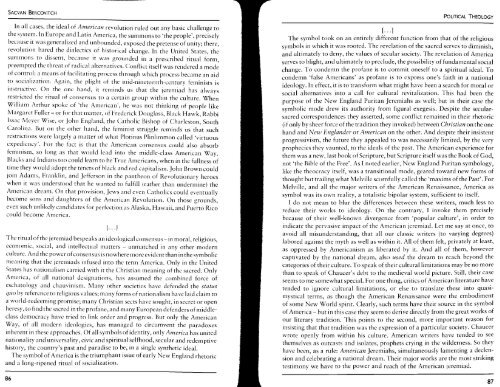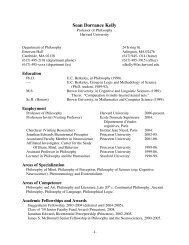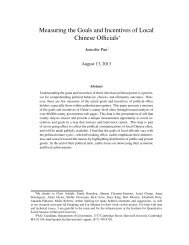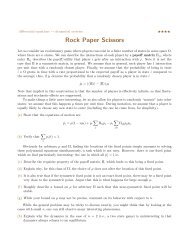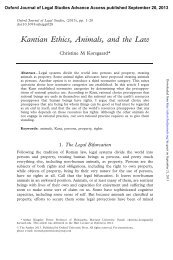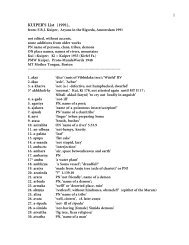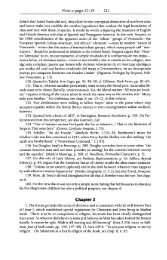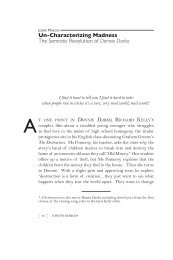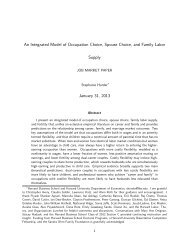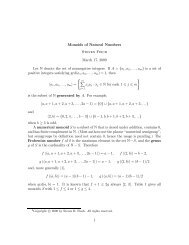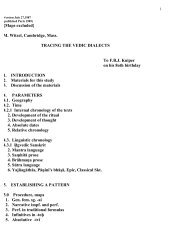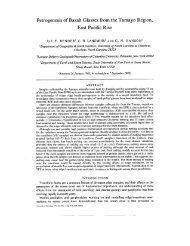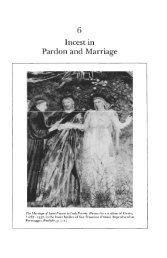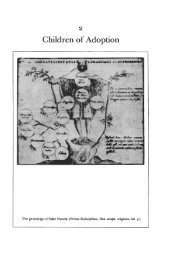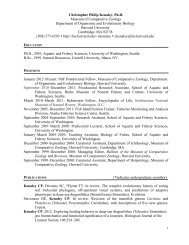THE AMERICAN JEREMIAD - People.fas.harvard.edu
THE AMERICAN JEREMIAD - People.fas.harvard.edu
THE AMERICAN JEREMIAD - People.fas.harvard.edu
You also want an ePaper? Increase the reach of your titles
YUMPU automatically turns print PDFs into web optimized ePapers that Google loves.
SACVAN BERCOVITCH<br />
In all cases, the ideal of American revolution ruled out any basic challenge to<br />
the system. In Europe and Latin America, the summons to 'the people', precisely<br />
because it was generalized and unbounded, exposed the pretense of unity; there,<br />
revolution bared the dialectics of historical change. In the United States, the<br />
summons to dissent, because it was grounded in a prescribed ritual form,<br />
preempted the threat of radical alternatives. Conflict itself was rendered a mode<br />
of control: a means of facilitating process through which process became an aid<br />
to socialization. Again, the plight of the mid-nineteenth-century feminists is<br />
instructive. On the one hand, it reminds us that the jeremiad has always<br />
restricted the ritual of consensus to a certain group within the culture. When<br />
William Arthur spoke of 'the American', he was not thinking of people like<br />
Margaret Fuller- or for that matter, of frederick Douglass, Black Hawk, Rabbi<br />
Issac Meyer Wise, or ./ohn England, the Catholic Bishop of Charleston, South<br />
Carolina. But on the other hand, the feminist struggle reminds us that such<br />
restrictions were largely a matter of what Plotinus Plinlimmon called 'virtuous<br />
expediency'. For the fact is that the American consensus could also absorb<br />
feminism, so long as that would lead into the middle-class American Way.<br />
Blacks and Indians too could learn to be True Americans, when in the fullness of<br />
time they would adopt the tenets of black and red capitalism. John Brown could<br />
join Adams, Franklin, and Jefferson in the pantheon of Revolutionary heroes<br />
when it was understood that he wanted to fulfill (rather than undermine) the<br />
American dream. On that provision, ./ews and even Catholics could eventually<br />
become sons and daughters of the American Revolution. On those grounds,<br />
even such unlikely candidates for perfection as Alaska, Hawaii, and Puerto Rico<br />
could become America.<br />
[· .. 1<br />
The ritual ofthe jeremiad bespeaks an ideological consensus- in moral, religious,<br />
economic, social, and intellectual matters - unmatched in any other modern<br />
culture. And the power ofconsensus is nowhere more evident than in the symbolic<br />
meaning that the jeremiads infused into the term America. Only in the United<br />
States has nationalism carried with it the Christian meaning of the sacred. Only<br />
America, of all national designations, has assumed the combined force of<br />
eschatology and chauvinism. Many other societies have defended the status<br />
quo by reference to religious values; many forms of nationalism have laid claim to<br />
a world-redeeming promise; many Christian sects have sought, in secret or open<br />
heresy, to find the sacred in the profane, and many European defenders of middleclass<br />
democracy have tried to link order and progress. But only the American<br />
Way, of all modern ideologies, has managed to circumvent the paradoxes<br />
inherent in these approaches. Of all symbols ofidentity, only America has united<br />
nationality and universality, civic and spiritual selfhood, secular and redemptive<br />
history, the country's past and paradise to be, in a single synthetic ideal.<br />
The symbol of America is the triumphant issue of early New England rhetoric<br />
and a long-ripened ritual of socialization.<br />
86<br />
POLITICAL <strong>THE</strong>OLOGY<br />
[...j<br />
The symbol took on an entirely di fferent function from that of the religious<br />
symbols in which it was rooted. The revelation of the sacred serves to diminish,<br />
and ultimately to deny, the values of secular society. The revelation of America<br />
serves to blight, and ultimately to preclude, the possibility of fundamental social<br />
change. To condemn the profane is to commit oneself to a spiritual ideal. To<br />
condemn 'false Americans' as profane is to express one's faith in a national<br />
ideology. In effect, it is to transform what might have been a search for moral or<br />
social alternatives into a call for cultural revitalization. This had been the<br />
purpose of the New England Puritan Jeremiahs as well; but in their case the<br />
symbolic mode drew its authority from figural exegesis. Despite the secularsacred<br />
correspondences they asserted, some conflict remained in their rhetoric<br />
(if only by sheer force ofthe tradition they invoked) between Christian on the one<br />
hand and New Englander or American on the other. And despite their insistent<br />
progressivism, the future they appealed to was necessarily limited, by the very<br />
prophecies they vaunted, to the ideals of the past. The American experience for<br />
them was a new, last book of Scripture, but Scripture itself was the Book of God,<br />
not 'the Bible of the Free'. As I noted earlier, New England Puritan symbology,<br />
like the theocracy itself, was a transitional mode, geared toward new forms of<br />
thought but trailing what Melville scornfully called the 'maxims of the Past'. For<br />
Melville, and all the major writers of the American Renaissance, America as<br />
symbol was its own reality, a totalistic bipolar system, sufficient to itself.<br />
I do not mean to blur the differences between these writers, much less to<br />
r<strong>edu</strong>ce their works to ideology. On the contrary, I invoke them precisely<br />
because of their well-known divergence from 'popular culture', in order to<br />
indicate the pervasive impact of the American jeremiad. Let me say at once, to<br />
avoid all misunderstanding, that all our classic writers (to varying degrees)<br />
labored against the myth as well as within it. All of them felt, privately at least,<br />
as oppressed by Americanism as liberated by it. And all of them, however<br />
captivated by the national dream, also used the dream to reach beyond the<br />
categories of their culture. To speak of their cultural limitations may be no more<br />
than to speak of Chaucer's debt to the medieval world picture. Still, their case<br />
seems to me somewhat special. For one thing, critics of American literature have<br />
tended to ignore cultural limitations, or else to translate these into quasimystical<br />
terms, as though the American Renaissance were the embodiment<br />
of some New World spirit. Clearly, such terms have their source in the symbol<br />
of America - but in this case they seem to derive directly from the great works of<br />
our literary tradition. This points to the second, more important reason for<br />
insisting that that tradition was the expression of a particular society. Chaucer<br />
wrote openly from within his culture. American writers have tended to see<br />
themselves as outcasts and isolates, prophets crying in the wilderness. So they<br />
have been, as a rule: American Jeremiahs, simultaneously lamenting a declension<br />
and celebrating a national dream. Their major works are the most striking<br />
testimony we have to the power and reach of the American jeremiad.<br />
87


